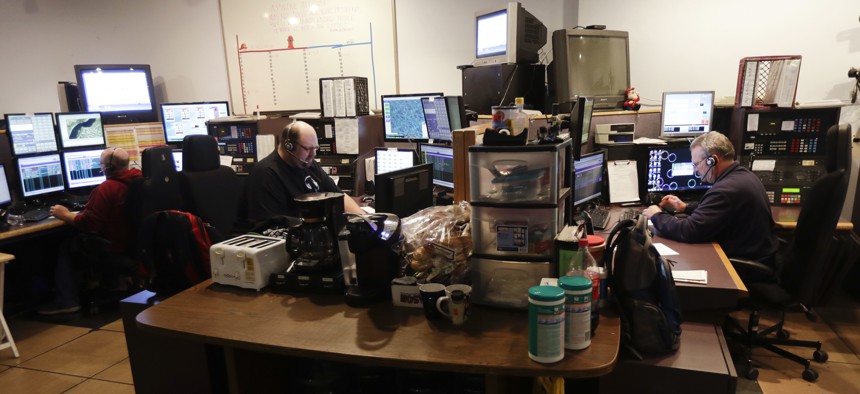Five States Diverted 911 Fees For Other Purposes, FCC Says

Communications officers in 2016 work in the 911 dispatch center at the Rensselaer County Public Safety Building in Troy, N.Y. AP Photo
Montana was removed from the list of states shamed by the federal agency after the state banned the practice of diverting these funds.
States collected more than $2.6 billion in 911 fees and service charges from wireless and telephone users in 2018, but not all of the money was used to pay for emergency calling systems or staff.
Five states used approximately $187 million in fees for expenditures not related to 911 systems in 2018, according to a recent report issued by the Federal Communications Commission. While FCC Chairman Ajit Pai called the diversion of funds “unacceptable,” the report signals some improvement, with one fewer state flagged as a diverter of fees 2018 compared to 2017.
The five states that diverted funds in 2018, the latest year for which the FCC collected data, are Nevada, New Jersey, New York, Rhode Island, and West Virginia. The prior year, the same five states plus Montana were identified as having diverted funds.
“When Americans pay 911 fees on their phone bills, they expect that money to fund 911-related services,” Pai said. “Instead, more than 7% of the fees collected went to other purposes.”
Montana was previously chastised by FCC Commissioner Michael O’Rielly for its 2017 transfer of $2 million in 911 fees to a state account in order to pay for buyouts in the Montana University System.
“911 fees are paid by consumers to preserve, operate, and improve the 911 public safety network, not to serve as a piggy-bank that can be raided to fix state budget shortfalls,” O’Rielly wrote in a Sept. 9, 2019 letter sent to Montana’s governor urging him to ensure the money was repaid.
In his reply, Governor Steve Bullock sought to explain the transfer, indicating the $2 million was transferred from a surplus fund of $10 million that had accumulated over a decade as 911 fee collection outpaced expenditures. Further, Bullock said the state legislature adopted a measure in 2017 that prevents 911 fees from being transferred to the general fund.
The FCC concluded that the state did not divert funds in 2018.
The $2.6 billion in 911 fees collected by the states equates to about half the amount of money that states estimate it costs to provide emergency call service. Federal lawmakers have sought unsuccessfully to ban diversion of 911 funds in order to ensure public safety services and necessary 911 infrastructure upgrades are funded.
In response to the latest FCC report, Republican lawmakers urged passage of federal legislation that would ban 911 fees from being used for other purposes.
“Diverting 9-1-1 fees may result in understaffed calling centers, training issues, longer wait times during an emergency, and may inhibit the ability of 9-1-1 call centers to support digital age technologies,” wrote the ranking member on the U.S. House Energy and Commerce Committee Rep. Greg Walden and Rep. Robert Latta. “Congress should evaluate the appropriate remedies to hold those accountable who routinely flout the law.”
Among the five states identified as improperly using 911 fees, the amount of money diverted and what it was spent on varies. In some cases, states told the FCC that they were still using the money for law enforcement purposes.
The FCC said New Jersey diverted $92 million in 911 fees. The state indicated that it deposited all of the $122 million in collected 911 fees into an account that pays for state 911 emergency telecommunication services. But that fund is also used to help pay for a portion of the state police and national guard’s operating budget, so FCC found that money had been misspent.
In Nevada, the FCC said 911 fees were diverted by one municipality to help pay for body-worn cameras for police. State lawmakers approved legislation in 2017 that allowed the state to increase the 911 fee to help pay for body cameras. While Nevada was not found to have directly diverted funds, the FCC said the government of Carson City indicated it used an undisclosed portion of the fees to pay for the camera technology.
The FCC determined that $1 million out of the $37 million in 911 fees collected by West Virginia was diverted. In West Virginia’s explanation of the spending, the state said that the money was spent to subsidize construction of cellular towers that improved 911 wireless coverage. The FCC noted that while expanding cellular coverage enhances the public’s ability to call 911, the money is supposed to be spent on call-handling systems operated by state and local authorities and not tapped to expand commercial network construction.
In Rhode Island, about 90% of the state’s 911 fees are deposited in a general fund, which is used to pay for the statewide 911 service. Because the general fund can be used to pay for various programs within the state, the FCC said this still counts as diversion.
Finally, in New York, the state collects $1.20 monthly from each cell phone user. That totals approximately $200 million in 911 fees collected in 2018. But under state law, 41.7% of the 911 fees collected are obligated to the state’s general fund and the remainder is deposited in a state public safety communications account. New York did not disclose to the FCC how much was deposited in the general fund, but the FCC estimates it was nearly $83 million. Further, the FCC said New York had not said how it spent the remaining funds that were deposited in the other account or if those expenditures were 911-related.
Andrea Noble is a staff correspondent for Route Fifty.
NEXT STORY: How Wealthy Towns Keep People With Housing Vouchers Out





